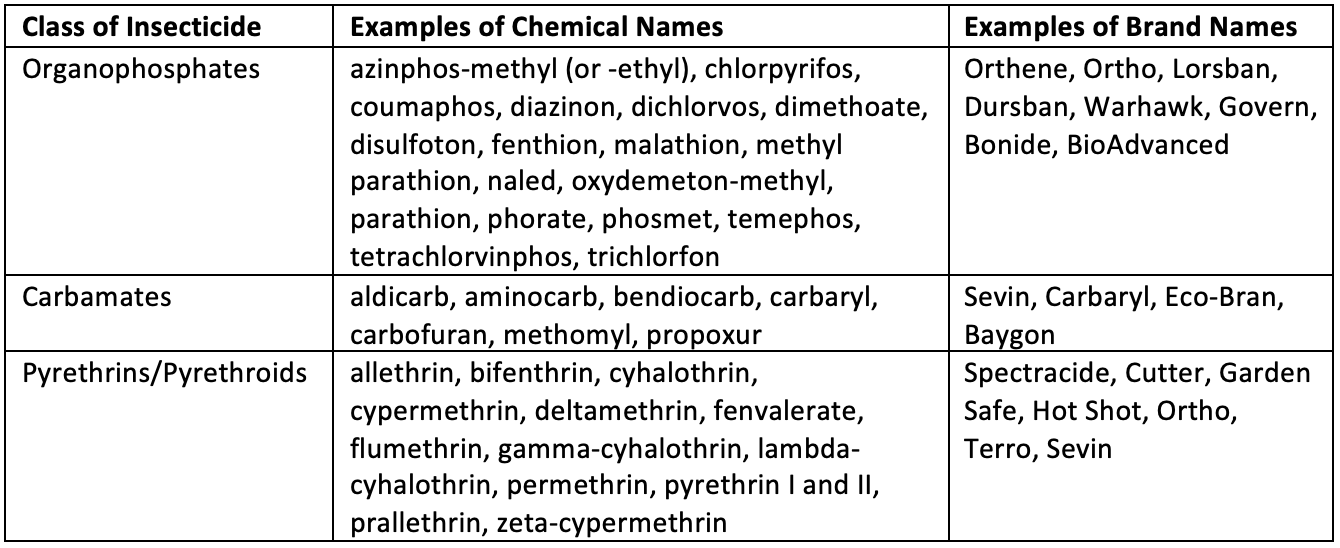Insecticide Poisoning in Dogs
Insecticide ingestion is consistently in the top 10 common toxicities for pets in addition to pesticide ingestion, according to the ASPCA Animal Poison Control Center. Here’s some useful information on why dogs should not consume insecticides and what to do if you suspect your dog may have eaten them.
Why Are Insecticides Poisonous to Dogs?
Insecticides are chemicals meant to kill, destroy, prevent, or repel insects. The EPA recognizes 20 insecticide classes, with nearly 400 chemical compounds and more than 17,000 products on the market.
Of the top four U.S. insecticide active ingredients, two are organophosphates (acephate and malathion), one is a carbamate (carbaryl), and one is pyrethrin/pyrethroids. The CDC reports organophosphates to be the most widely used insecticide today, and therefore the most likely class of insecticides your pet may be exposed to. While they are a major cause of animal poisoning, organophosphates vary greatly in their degree of toxicity.
The exact way each insecticide works to kill insects differs in the various classes and products, but many insecticides are made to interrupt the bug’s nervous system. For example, organophosphate and carbamate insecticides work by blocking an enzyme in the body called acetylcholinesterase. When this enzyme is blocked, nerve cells in the body experience overstimulation, which ultimately causes muscle tremors, paralysis, and death. Pyrethrin/pyrethroids act in a similar manner to overexcite the insect’s nervous system through sodium channels in the cell membrane.
Unfortunately, dogs and other mammals can experience toxicity from insecticide poisoning in the same ways.
Types of Insecticides
There are too many chemical names, brands, and types of insecticides to provide a full list. However, here is a partial list of chemical names, and the brands that use those chemicals, for the three most common insecticide classes.

Because there is such a huge variety of insecticide classes, chemical names, and brand names, the best thing to do if your pet is exposed to an insecticide or any other lawn and garden product is to call the Pet Poison Helpline at 855-764-7661 or the ASPCA Animal Poison Control Center at 888-426-4435 for help in determine what your pet has been exposed to and if you need to seek emergency veterinary care.
How Much Insecticide Does It Take to Poison a Dog?
The toxicity of each insecticide varies depending on the class of insecticide and specific active ingredient or chemical, as well as the amount ingested and the size of your dog. There is no general rule of thumb, and it is best to contact the experts at one of the pet poison hotlines when figuring out if your dog has ingested a toxin.
Dogs may become exposed to insecticide poisoning by:
-
Walking on the lawn immediately after application of insecticide, then licking their feet
-
Eating grass or weeds near recently applied insecticide
-
Eating dead or injured bugs that have been sprayed with insecticide
-
Gaining access to insecticide containers (including sprays, dusts, liquids, gels, baits, or slow-release diffusion) and ingesting the product
Symptoms of Insecticide Poisoning in Dogs
Symptoms of insecticide poisoning in dogs typically occur within a few minutes of exposure, but they can be delayed up to a few hours. Clinical signs can vary based on the active ingredient of the insecticide consumed, but common clinical signs include:
-
Irritation to the skin, eyes, or mucous membranes
-
Vomiting/diarrhea
-
Abdominal cramps or pain
-
Uncontrolled urination or defecation
-
Weakness/incoordination/collapse
-
Trouble breathing
-
Muscle spasms or tremors
-
Seizures/death
What Should I Do if My Dog Eats Insecticide?
If your dog has eaten insecticide, it is important to try to find out how much and what type of product was consumed. Toxicity in dogs varies greatly among insecticides and can range from mild to life-threatening. It is ideal to have the packaging or find the product label online to verify which ingredients are present in the product ingested.
Get as much information as possible by calling one of the poison hotlines and call your veterinarian to discuss whether your pet needs to be seen.
Should I Induce Vomiting if My Dog Eats Insecticide?
Do not induce vomiting at home unless you have been instructed to by a veterinarian. If you believe your pet ate an insecticide, ate a bug killed with insecticide, or you saw your dog eat either, the best thing to do is to call your veterinarian to determine next action.
Treatment of Insecticide Poisoning in Dogs
If you see your pet eat insecticide or see evidence of it, it is critical to immediately call your veterinarian. They will collect a thorough history, so it is important that you have the product name, packaging, or detailed label ingredients. Dogs should be treated as quickly as possible.
If your pet ate insecticide (or a bug with insecticide sprayed on it) within the past hour, your veterinarian may recommend inducing vomiting at the hospital as a means of decontamination. If your dog is already showing clinical signs, it may be too late to induce vomiting due to risk of aspiration pneumonia. They may also give activated charcoal to bind any additional toxin. Activated charcoal is a medication that absorbs the toxin and then passes through the GI tract without it being absorbed. It is also important to wash off any insecticide or residue that may be present on the skin.
In severe cases (such as ingestion of an extremely toxic active ingredient or a large amount of insecticide), your pet may need to be hospitalized for IV fluids and undergo additional therapy to treat muscle twitching and seizures. A complete blood count, serum blood chemistry, and urinalysis will all likely be recommended for a baseline evaluation. Depending on the insecticide your pet was exposed to, antidotal treatments specific to the active ingredient may be available.
Prognosis of Insecticide Poisoning in Dogs
Early diagnosis and aggressive treatment are crucial in treating insecticide poisoning in dogs. Because of the vast number of products on the market, it is impossible for the pet parent to determine which products are low toxicity or high toxicity on their own. It is crucial to use pet poison hotlines to help make this assessment.
Dogs have their best chance of survival with quick identification of the toxin ingested and treatment by a veterinarian. Insecticide poisoning can be deadly, but with prompt treatment, the prognosis is usually good. If the toxicity is severe, dogs may remain hospitalized for several days. Typically, dogs that recover go on to live normal lives with no secondary consequences.
Prevention of Insecticide Poisoning in Dogs
When it comes to toxicity, prevention is key! Dogs are extremely curious and will be drawn not only to the insecticide containers but also insects killed with the insecticide. Do not allow your pet near areas where insecticide has been sprayed until it is thoroughly dried and be sure to clean up any dead insects that you used insecticide on. The best way to prevent insecticide poisoning in dogs is to keep all lawn and garden products—including fertilizers, insecticides, and pesticides—in a safe and secure place out of paws’ reach.
References
American Society for Prevention of Cruelty to Animals. The Top 10 Pet Toxins of 2021. March 2022.
US Environmental Protection Agency. Insecticides. May 2022.
North Carolina State University. Major Classes of Conventional Insecticides. 2015.
Pesticide Action Network. Pesticides 101.
US Centers for Disease Control and Prevention. National Biomonitoring Program. April 2017.
Gupta, R. Merck Manual Veterinary Manual. Insecticide Poisoning. October 2020.
Featured Image: iStock.com/valentinrussanov
